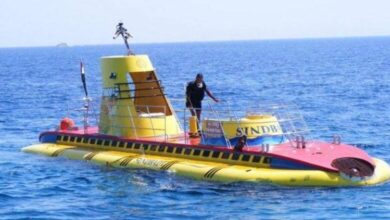The Ministry of Tourism on Wednesday instructed Egypt’s Chamber of Diving and Water Sports (CDWS) to suspend all diving activities in the Red Sea resort town of Sharm al-Sheikh. The closure is expected to remain in place until the end of tomorrow.
The move follows three separate shark attacks north of the Sinai Peninsula’s Naema Bay, in which three Russian tourists were injured, within the last 24 hours. The victims had been snorkeling near local coral reefs at different times of the day when the attacks occurred.
The victims–one man and two women–are currently receiving medical treatment.
According to instructions from the Ministry of Tourism, all beaches will be closed to the public and all diving and water activities halted, except in the Ras Mohammed Nature Preserve.
“We’re monitoring the situation very closely and working together with the authorities to ensure the safety of visitors,” said CDWS chairman Hesham Gabr.
While describing the incident as “an extreme rarity,” Gabr said that the chamber was working closely with officials on discovering the reason for the sharks’ unusual behavior, which, he said, could be related to illegal shark fishing.
According to the CDWS, officials from the South Sinai National Park have tracked down the shark in question, which was identified as an oceanic white-tip shark.
"The South Sinai National Park, led by head marine biologist Mohammed Salem, is currently attempting to capture the shark with the aim of releasing it back into the wild in a remote area in the Gulf of Suez,” read a statement from the chamber. “The location will be a safe distance from any tourist resorts in the Red Sea.”
“This is an extremely unusual incident,” said Gabr. “However, with such a frequency of attacks in the last 24 hours, measures have been taken by the Ministry of Tourism to close the sea to give teams sufficient time to track down and capture the shark.”
“Attacks on humans by sharks are extremely rare, and this species would normally not be found close to shore on bathing beaches,” said Richard Peirce, chairman of the UK-based Shark Trust. “The Trust has been informed that a single animal is thought to be responsible for all three incidents and that attempts are being made to catch the shark.”
According to Pierce, figures from the International Shark File (www.sharkattackfile.net), the databases of which include 1580 recent shark attacks, show only nine reports of attacks by oceanic white tip sharks on humans since records began being kept.
Shark fishing has been strictly proscribed in the Red Sea since 2001. According to a recent statement by the Ministry of Environment, several shark poachers from Yemen have been intercepted in Egyptian territorial waters. Shark fishing was fully prohibited off of Egypt’s Red Sea coast by legislation passed in 2005.
Shark attacks in the Red Sea are reported once every year or two, according to Mohamed Salem, director of South Sinai Conservation. According to Reuters, the last person to die from a shark attack in Egypt was killed while snorkeling near Sharm al-Sheikh in 2004.




